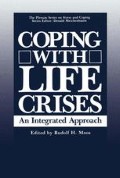Abstract
While awaiting an ambulance after sustaining a grave injury in a sudden, terrifying automobile accident, Jon Krapfl mentally prepared for death. The ambulance attendants wanted him to remain hopeful and hesitated to tell him that his neck was broken. By sharing his intense fear of imminent death, Jon managed to obtain the information he sought. During his lengthy rehabilitation, Jon experienced sharp, insistent pain, felt he was losing his mind due to intrusive hallucinations, found it hard to accept his injury and physical limitations, and ruminated about how his wife and children would confront his disability. Jon faced these issues effectively and eventually returned to his job as a professor of psychology at the University of West Virginia. He later construed the forced review of his life as a “freeing experience” and came to see his ordeal as having “enriched my life.”12
Access this chapter
Tax calculation will be finalised at checkout
Purchases are for personal use only
Preview
Unable to display preview. Download preview PDF.
References
Bandura, A. Self-efficacy mechanism in human agency. American Psychologist, 1982, 37, 122–147.
Bloom, B. L., Hodges, W. F., and Caldwell, R. A. A preventive intervention program for the newly separated: Initial evaluations. American Journal of Community Psychology, 1982, 10, 251–264.
Bloom, B. L., Hodges, W. F., Kern, M. B., and McFaddin, S. C. A preventive intervention program for the newly separated: Final evaluations. American Journal of Orthopsychiatry, 1985, 55, 9–26.
Caplan, G. Principles of preventive psychiatry. New York: Basic Books, 1964.
Cassem, N. Bereavement as indispensable for growth. In N. B. Schoenberg and Others (Eds.), Bereavement: Its psychosocial aspects. New York: Columbia University Press, 1975.
Cowen, E. L. Primary prevention in mental health: Past, present, and future. In R. D. Feiner, L. A. Jason, J. N. Moritsugu, and S. S. Farber (Eds.), Preventive psychology: Theory, research and practice. New York: Pergamon Press, 1983.
Dimsdale, J. Coping—every man’s war. American Journal of Psychotherapy, 1978, 32, 402–413.
Erikson, E. H. Childhood and society (2nd cd.). New York: Norton, 1963.
Gibbs, L. M. Community response to an emergency situation: Psychological destruction and the Love Canal. American Journal of Community Psychology, 1983, 11, 116–125.
Halpern, R., and Covey, L. Community support for adolescent parents and their children: The Parent-to-Parent Program in Vermont. Journal of Primary Prevention, 1983, 3, 160–173.
Heller, K., Price, R. H., Reinharz, S., Riger, S., and Wandersman, A. Psychology and community change: Challenges of the future ( 2nd ed. ). Homewood, Il.: Dorsey, 1984.
Krapfl, J. Traumatic injury in mid-life. In E. Callahan and K. McCluskey (Eds.), Life span developmental psychology: Non-normative life events. New York: Academic Press, 1983.
Lazarus, R., and Folkman, S. Stress, appraisal, and coping. New York: Springer, 1984.
Levinson, D. The mid-life transition: A period in adult psychosocial development. Psychiatry, 1977, 40, 99–112.
Lieberman, M. A., Borman, L. D., and Associates. Self-help groups for coping with crisis: Origins, members, processes, and impact. San Francisco: Jossey-Bass, 1979.
Lindemann, E., and Lindemann, E. Beyond grief: Studies in crisis intervention. New York: Aronson, 1979.
Lindy, J. D., Grace, M. C., and Green, B. L. Survivors: Outreach to a reluctant population. American Journal of Orthopsychiatry, 1981, 51, 468–478.
Medinger, F., and Varghese, R. Psychological growth and the impact of stress in middle age. InternationalJournal of Aging and Human Development, 1981, 13, 247–263.
Moos, R. Coping with physical illness: New perspectives. New York: Plenum Press, 1984.
Moos, R., and Billings, A. Conceptualizing and measuring coping resources and processes. In L. Goldberger and S. Breznitz (Eds.), Handbook of stress: Theoretical and clinical aspects. New York: Macmillan, 1982.
Neugarten, B. Time, age, and the life cycle. American Journal of Psychiatry, 1979, 136, 887–894.
Perloff, L. Perceptions of vulnerability to victimization. Journal of Social Issues, 1983, 39, 41–61.
Raphael, B. A primary prevention action programme: Psychiatric involvement following a major rail disaster. Omega, 1979–1980, 10, 211–226.
Rees, H., and Smyer, M. The dimensionalization of life events. In E. Callahan and K. McCluskey (Eds.), Life span developmental psychology: Non-normative life events. New York: Academic Press, 1983.
Singh, B., and Raphael, B. Postdisaster morbidity of the bereaved: A possible role for preventive psychiatry. Journal of Nervous and Mental Disease, 1981, 169, 203–212.
Stolberg, A. L., and Garrison, K. M. Evaluating a primary prevention program for children of divorce. American Journal of Community Psychology, 1985, 13, 111–124.
Taylor, S., Wood, J., and Lichtman, R. It could be worse: Selective evaluation as a response to victimization. journal of Social Issues, 1983, 39, 1–40.
Vachon, M. L. S., Lyall, W. A. L., Rogers, J., Freedman-Letofsky, K., and Freeman, S. J. J. A controlled study of self-help intervention for widows. American Journal of Psychiatry, 1980, 137, 1380–1384.
Valent, P. The Ash Wednesday bushfires in Australia. Medical Journal of Australia, 1984, 141, 291–300.
Wallerstein, J. Children of divorce: Stress and developmental tasks. In N. Garmezy and M. Rutter (Eds.), Stress, coping and development in children. New York: McGraw-Hill, 1983.
Wallerstein, J., and Kelly, J. Surviving the breakup: How children and parents cope with divorce. New York: Basic Books, 1980.
Author information
Authors and Affiliations
Editor information
Editors and Affiliations
Rights and permissions
Copyright information
© 1986 Springer Science+Business Media New York
About this chapter
Cite this chapter
Moos, R.H., Schaefer, J.A. (1986). Life Transitions and Crises. In: Moos, R.H. (eds) Coping with Life Crises. The Springer Series on Stress and Coping. Springer, Boston, MA. https://doi.org/10.1007/978-1-4684-7021-5_1
Download citation
DOI: https://doi.org/10.1007/978-1-4684-7021-5_1
Publisher Name: Springer, Boston, MA
Print ISBN: 978-0-306-42144-0
Online ISBN: 978-1-4684-7021-5
eBook Packages: Springer Book Archive

